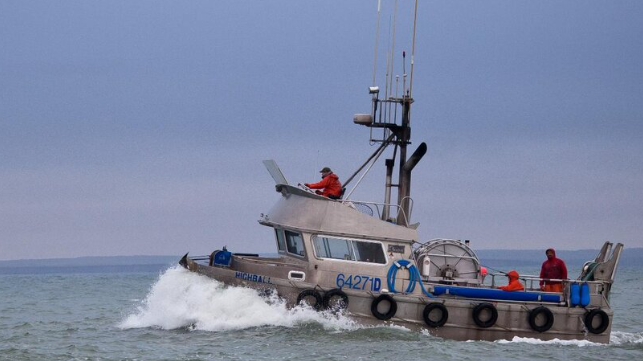Bristol Bay Fishermen Thank USACE for Pebble Mine Permit Decision

In an unexpected turn, the Army Corps of Engineers has denied a Clean Water Act permit for the proposed Pebble Mine, a open-pit copper extraction project located near the headwaters of the world's largest sockeye salmon run. The Pebble site contains one of the largest undeveloped copper and gold deposits in the world, and its backers have signaled their intention to appeal.
"In its record of decision, USACE determined that the applicant’s plan for the discharge of fill material does not comply with Clean Water Act guidelines and concluded that the proposed project is contrary to the public interest," the agency's Alaska District said in a statement.
Pebble Partnership's share price fell from $0.87 to $0.40 within hours of the announcement. The project's opponents hailed the decision as a recognition of the Pebble Mine's risk to the billion-dollar-per-year Bristol Bay fishery.
“A permit denial from the Army Corps is a triumph for the people of Bristol Bay who have fought tirelessly against Pebble mine for well over a decade," said Bristol Bay Native Corporation (BBNC) president and CEO Jason Metrokin. "We thank the Corps for acknowledging this reality in its decision."
“Sometimes a project is so bad, so indefensible, that the politics fall to the wayside and we get the right decision. That is what happened today,” Tim Bristol, the executive director of SalmonState, which represents Alaska's salmon fishing industry.
“The opposition to this project from all corners of the political spectrum runs strong and deep. The process has played out, and the science is clear. There is no way this ill-conceived project can coexist with Bristol Bay salmon,” said Nelli Williams, the Alaska director of sport fishing organization Trout Unlimited. “The denial of Pebble’s permit is a victory for American jobs, rural communities, and a fishing and hunting paradise long threatened by this shortsighted and reckless proposal."
“Today Bristol Bay’s residents and fishermen celebrate the news that Pebble’s Permit has been denied; tomorrow we get back to work, asking the Environmental Protection Agency to reestablish protections for Bristol Bay under the Clean Water Act,” said Commercial Fishermen for Bristol Bay Executive Director Katherine Carscallen. “We’ve learned the hard way over the last decade that Pebble is not truly dead until protections are finalized."
The Pebble Mine has come down a long road. The mine was proposed in the 2000s with backing from Northern Dynasty Minerals, an NYSE-listed firm sharing an address and a management team with Canadian mining company Hunter Dickinson. It has faced stiff opposition from salmon fishermen and Bristol Bay residents for years.
In 2014, the EPA halted the mine's permitting process, finding that the project posed unacceptable levels of risk to Bristol Bay's salmon runs. Risks EPA identified included salmon habitat loss; elevated levels of dissolved copper in stream water; and (in the worst case) mine waste containment failure. The risk of low-level release of copper into the watershed was a particular concern, as research suggests that copper is hazardous to salmon at concentrations measured in millionths of a gram per liter.
In July 2019, under new leadership, the EPA reversed its decision and allowed permitting to proceed once more. The U.S. Army Corps of Engineers completed a draft Environmental Impact Statement in February 2020. The draft document was widely seen as favorable to the mine's development, and it drew considerable controversy.
"The draft EIS . . . lacks critical detail and contains an unacceptable number of deficiencies, omissions and errors. In many cases its conclusions are clearly wrong," wrote Rich Borden, the former head of environment for Rio Tinto’s Copper and Diamonds Product Group in an op-ed for the Anchorage Daily News.
Revisions and revelations
In August, the USACE asked Pebble's backers to revise its project plan. However, that did not dampen the mood at Pebble's offices: in a series of videoconference meetings recorded by undercover activists, Pebble's leadership team expressed confidence that the mine would still be approved, citing their close personal relationships with high-ranking political figures and regulators - including Alaska Governor Michael Dunleavy, U.S. Senators Lisa Murkowski and Dan Sullivan, and the USACE Alaska District Regulatory Division's director, David Hobbie. The conversations also suggested that Pebble's executives expected a 200-year expanding operation at the mine site, not the constrained 20-year timeline described in their Clean Water Act permit application (and in statements to Congress).
After these "Pebble Tapes" were released to the public, Senators Murkowski and Sullivan disavowed any ties to Pebble and said that they would oppose the project. Sen. Murkowski went further, promising to use the appropriations process as leverage to block the mine's development. The fallout continued in the House, where the Transportation and Infrastructure Committee launched an investigation into USACE's handling of the Pebble permit application process.

that matters most
Get the latest maritime news delivered to your inbox daily.
When USACE announced that it would deny the mine's permit application, the Pebble Partnership's share price fell from $0.87 to $0.40 within hours. Though the outcome is a setback, Pebble said that its work would continue.
“Our team has worked closely with the USACE staff to understand their requirements for responsibly developing the project . . . All of these efforts led to a comprehensive, positive EIS for the project that clearly stated it could be developed responsibly. It is very disconcerting to see political influence in this process at the eleventh hour," said Pebble Partnership CEO John Shively in a statement. “For now, we will focus on sorting out next steps for the project including an appeal of the decision by the USACE."
The opinions expressed herein are the author's and not necessarily those of The Maritime Executive.
